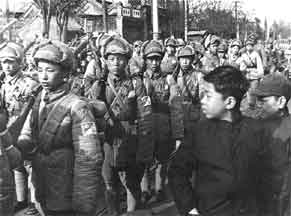1949 Communist Victory in China
The Nationalist Army essentially disintegrated after the fall of Tientsin and Peking. By July, the Nationalists announced that they would begin to withdraw to Taiwan. On October 1st, 1949 the People's Republic of China was officially proclaimed, with Peking as its capital.
The Nationalist Army in China, once a formidable force, experienced a period of precipitous decline following the fall of two key cities: Tientsin (now known as Tianjin) and Peking (Beijing). These two events marked pivotal turning points in the Chinese Civil War, dealing decisive blows to the Nationalist forces and their hold on the mainland. The loss of these significant urban centers left a power vacuum that rapidly got filled by the Communist forces, marking a shift in the overall control and power dynamics of the country.
The Nationalist Army's structure and unity suffered greatly in the wake of these losses. The army, which once held control over vast territories of China, started disintegrating, with troops deserting, surrendering, or getting captured. The decline wasn't merely a physical loss of men and territory; it had a profound psychological impact as well. The morale of the remaining soldiers dropped significantly as they saw their once mighty force crumble in the face of the relentless Communist onslaught.
By July, the Nationalists, recognizing their diminishing chances of retaining control over mainland China, announced a strategic withdrawal to Taiwan, an island province located off the southeastern coast of China. The decision was not a simple tactical retreat; it was a profound acknowledgment of the reality that they had lost control of the mainland. The Nationalists were under the leadership of Chiang Kai-shek, who had long been a critical figure in Chinese politics. The retreat to Taiwan signaled his intention to establish a stronghold there, hoping to regroup, rearm, and perhaps plan for a future return to the mainland.
Meanwhile, the Communists, under the leadership of Mao Zedong, were steadily gaining ground and consolidating their hold over the vast mainland territories. Their forces were sweeping across the country, establishing control over city after city, province after province. The fall of Tientsin and Peking was instrumental in accelerating their advances, further bolstering their control.
October 1st, 1949,the People's Republic of China (PRC) was officially proclaimed, signaling the end of the long and bloody civil war. The ceremony took place in Tiananmen Square, in the heart of the newly captured capital, Peking. Thousands of people gathered to witness Mao Zedong, standing atop the Gate of Heavenly Peace, declare the founding of the PRC. The proclamation marked the culmination of years of struggle and revolution. The Communists, who had once been the underdogs in this war, now controlled the vast mainland of China.
The establishment of the PRC with Peking as its capital was not just a symbolic move. It underscored the consolidation of Communist power across the mainland. Peking was an important cultural, political, and historical center, and its capture marked the comprehensive defeat of the Nationalist forces. The city's fall and subsequent establishment as the capital of the PRC symbolized the transfer of power, from the Nationalists to the Communists.
 >
>